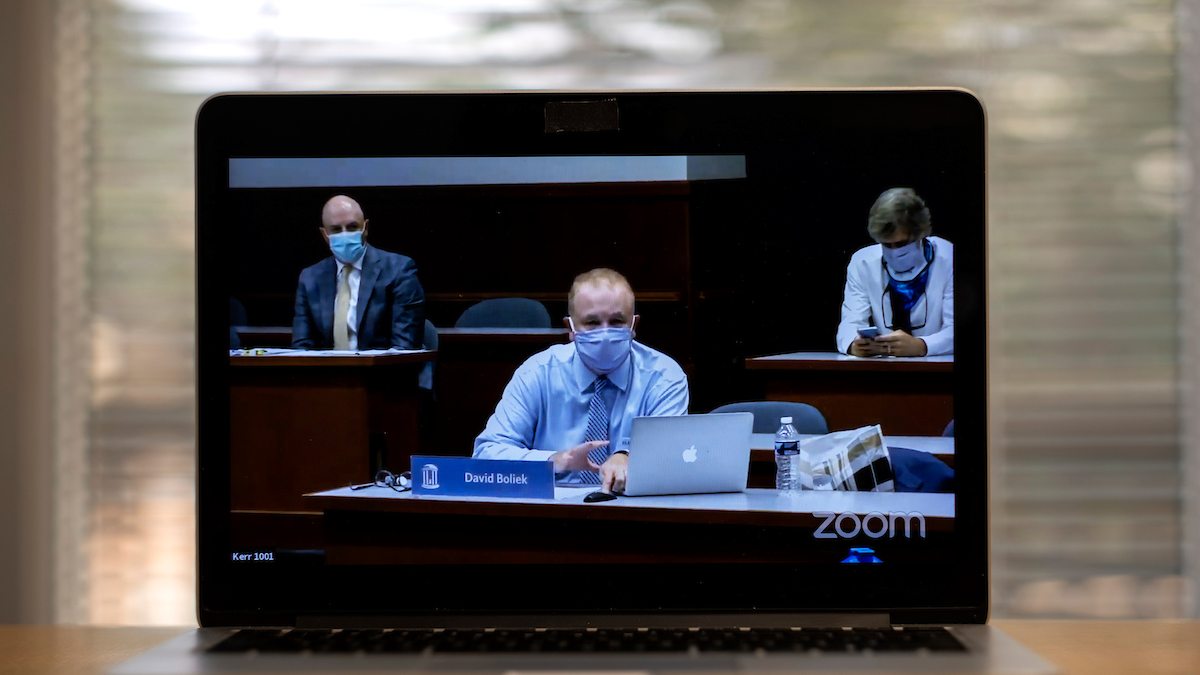Trustees approve policy for renaming campus buildings
In their July 16 meeting, the University Board of Trustees voted 12-1 in favor of new guidelines for removing names from campus buildings.

The University Board of Trustees followed up on its June 17 decision to lift the moratorium on changing building names by approving a new name removal process.
Trustees voted 12-1 to approve guidelines for removing names at the July 16 meeting, so that the University can “have in place a policy process that would ensure that each decision is taken with thoughtfulness, fairness and a commitment to ensuring that the names on our campus reflect the highest ideals of our University,” Chair Richard Stevens said.
Following community standards for group meetings, the 11 trustees who met in person wore face coverings and sat spaced far apart in a large auditorium in Kerr Hall, joined on Zoom by the two remaining trustees. The meeting was livestreamed for the public on YouTube.
At its July 10 meeting, the University Commission on History, Race and a Way Forward recommended that four names — Charles Brantley Aycock, Julian Shakespeare Carr, Josephus Daniels and Thomas Ruffin Sr. — be the first to be removed from campus buildings. The commission approved the list and an accompanying report containing extensive documentation of the repugnant behavior of these men.
Discussion of the list of names was not on the BOT’s agenda for this meeting, but Chancellor Kevin M. Guskiewicz requested that it be considered in a special meeting by July 31.
The policy requires a request to be made in writing and be accompanied by “scholarly historical evidence” of serious violations of federal or state law or “repugnant behavior.” Mitigating factors include “especially noteworthy” contributions to the University by someone whose views were “conventional at its time” or the person’s significant moderation of offensive views and behavior.
While racism isn’t specifically mentioned in the guidelines, the men on the commission’s list were white supremacists or slaveholders who practiced or advocated violence in support of their views. Three of the four had documented involvement in the campaign that led to the Wilmington Massacre of 1898, in which Black people were murdered, Black-owned businesses destroyed and an elected government overthrown by a white supremacist mob.
In introducing the guidelines for consideration, External Relations Committee Chair Gene Davis invoked Carolina’s reputation for being “The Light on the Hill.”
“We have what I view as a sacred responsibility to always be a light,” Davis said. “I believe that we are called to be a light that shines in the dark corners in which racism has festered for far too long.”
In his remarks, University Affairs Committee Chair Charles Duckett recommended two historical accounts of the Wilmington Massacre, “The Ghosts of 1898” by Timothy Tyson and “Wilmington’s Lie” by David Zucchino. “These are footnoted, historical, accurate pieces that explain to you what happened during this time,” he said. “Sometimes you have to look at it and say, ‘Can I defend this name on this building?’”
Duckett also defended the University’s nickname of Tar Heels from recent attacks on social media for being associated with Confederate soldiers. “I am very proud to be a Tar Heel,” he said, urging others to read more history before making decisions on what to reject from the past.
Trustees heard updates from Guskiewicz on the University’s plan for the fall semester. The chancellor reported that:
- 650 students have signed up for Carolina Away, a remote-only option;
- 57% of classes will be taught in person;
- numerous “off-ramps” are being developed for the return based on critical questions about testing, tracing, the capacity of local health care facilities and other factors; and
- an attestation document is being developed for community members to agree to abide by community standards before returning to campus
In other action, the trustees:
- voted to re-elect its current officers for a second term;
- heard from Board of Governors member David Powers, BOG liaison to the University, and recently elected Faculty Chair Mimi Chapman; and
- got an update on the University’s finances from Jonathan Pruitt, vice chancellor for finance and operations.




